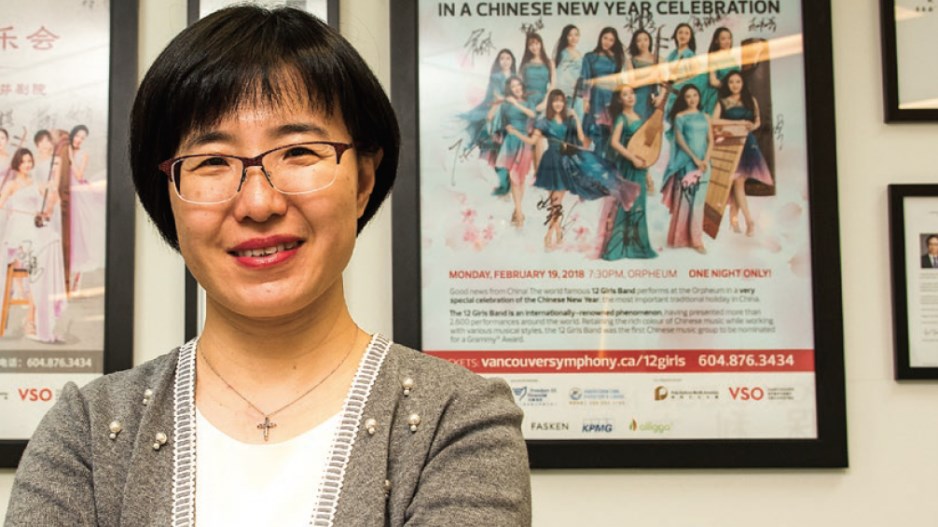The rising vitriol in the China-Canada relationship stemming from the Huawei Technologies Co. Ltd. affair has not yet seeped into the cultural sector, where the Canadian subsidiary of a Chinese state-owned conglomerate said it has no plans to halt its expansion in North America.
Poly Culture, the subsidiary of China Poly Group, the world’s third-largest auction house and one of the country’s biggest theatre/museum management firms, said its Vancouver-headquartered North American subsidiary will continue to localize its operations. It plans to move into non-Chinese art and music, including acting as the major community partner of Vancouver Art Gallery’s (VAG) French Moderns: Monet to Matisse exhibit that runs until May 20.
This is Poly North America’s second sponsorship of a major VAG exhibit. In 2017, Poly was a supporting sponsor of Claude Monet’s Secret Garden.
On top of the VAG events, Poly hosted two Chinese-Canadian painters’ exhibitions at its downtown Vancouver art centre within the last year, featuring work such as oil paintings and landscapes with significant western influence, in a bid to entice non-Chinese Vancouverites to connect with the gallery’s efforts.
“The fact is, the local art scene here needs more opportunities to engage with like-minded partners,” said Poly North America CEO and managing director Chen Yi. “The Monet to Matisse exhibit, I think, is a reflection of what we can help bring to the table, and as a member of the local community, I believe it’s our duty to do our part in promoting art in B.C…. But I think we can still do better. There’s a lot of room for improvement in bringing more non-Chinese-heritage visitors to our gallery, and that’s going to be one of our main objectives in the coming year.”
Chinese relations with Canada have nosedived in 2019 after the arrest of Huawei CFO Meng Wanzhou, who is now facing potential extradition to the United States. Meanwhile, China has stepped up its pressure on the Canadian economy, withdrawing the import permits of Canada’s two biggest canola exporters, Richardson International and Viterra Inc.
The latest development, along with the arrest of two Canadian citizens in China now facing charges of espionage, has led some former Canadian diplomats to call on Ottawa to counter Beijing’s moves. But Chen said Poly has not seen its relationships in Canada sour. She pointed out that it continues to work closely with the likes of the Vancouver Symphony Orchestra, signing a memorandum of understanding in 2017 and supporting the Vancouver Symphony Ball fundraiser for the last two years.
“For us, it’s been OK,” Chen said, adding she is not worried about the long-term effect of the Huawei affair. “Because we are purely in the cultural sphere, we’ve had a lot of positive response from groups like the Royal BC Museum and the Vancouver Academy of Music; when it comes to Canada’s relationship with China, there’s a long history of friendship there that I don’t think will be altered through what happens in the short term.”
Poly was the largest company attracted by the now-defunct HQ Vancouver provincial-federal initiative to attract regional headquarters to Vancouver.
The local office was set up in 2016 with an employee count of three; today, that number stands at 14, and Chen said Poly is now looking at potentially opening a second Canadian office in Toronto in a few years to promote business with Eastern Canada.
In addition to the 15 exhibits it has held at the Vancouver art centre so far, Poly Culture North America has attracted Canadian and U.S. artists to perform at the company’s theatres in China for a total of 169 performances in a bid to deepen artistic engagement. Italian-American pianist Giovanni Marradi is touring China on a Poly invitation, and Chen said the company signed an agreement with the Royal Winnipeg Ballet last year and is inching closer to another with the Vancouver Academy of Music. Both groups are expected to tour China.
Poly has had challenges in the past in setting up offices in the U.S. because the parent company was founded in the 1980s as a defence contractor with links to the Chinese military. But Chen said it has not run into any issues in engaging artists like Marradi.
“If there’s a demand in China for American performers or artists, of course we will pursue it. We haven’t seen too many challenges on that front. But Canada is definitely a more friendly market.”
Chen added that the film business, which is the last major focus of Poly Culture’s three branches of business, is just getting on track in China after its film, The Hidden Sword, was shown at the Vancouver International Film Festival and the Montreal World Film Festival in 2017, winning an award at the latter.
The goal, Chen said, is to find digital effects companies that Poly can take an ownership stake in so the company can enable its Vancouver partner to grow in North America or back in China. •




